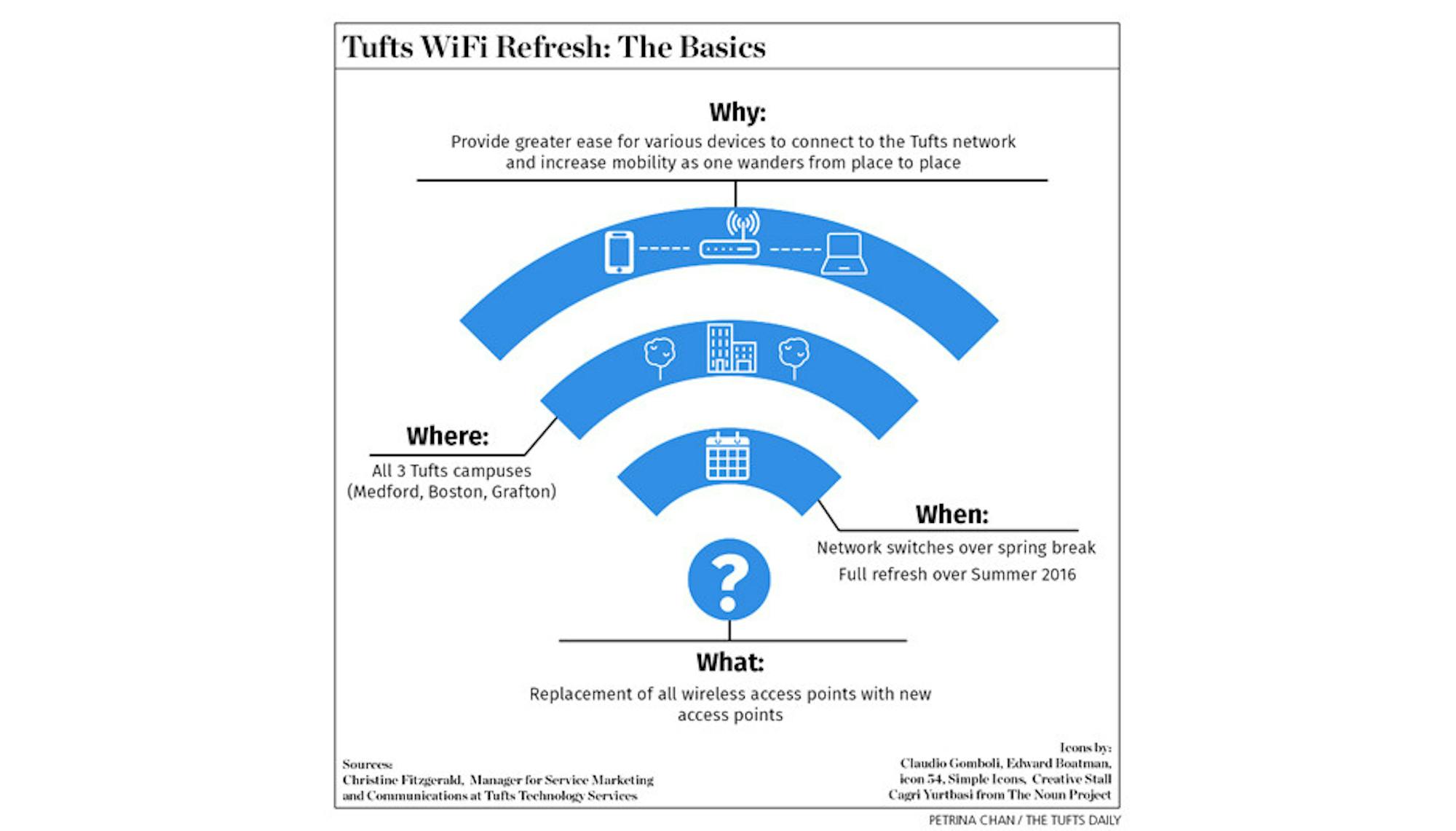Tufts Technology Services (TTS) will prepare for a full wifi refresh over the summer by implementing network switch replacements throughout the upcoming spring break on the Medford/Somerville campus. The preliminary work will start Monday, March 21 and continue through Friday, March 25, according to a campus-wide email sent last week by TTS Director of Enterprise Infrastructure Theresa Regan.
The full wifi refresh will occur after commencement in May, and will be completed by the start of the upcoming academic year, the email read.
According to Regan, the email was sent to all students living in residence halls to provide information in advance of work being done over spring break. TTS is preparing community announcements for students, faculty and staff from the broader Medford/Somerville campus about the wifi refresh for the summer, she said.
“The wifi refresh is an aggressive initiative across all three Tufts campuses,” Regan wrote to the Daily in an email. “This initiative will replace all wireless access points with new access points which will better support the growing numbers and types of mobile devices relying [on] wifi connectivity through newer technologies.”
According to the email, the work will be completed daily between 8 a.m. and 4 p.m. during the upcoming spring break. While this work is being completed, neither wired nor wireless services will be available in the residence hall where the work is being conducted.
“The wifi refresh on the Medford/Somerville campus will be staged building-by-building, residence hall-by-residence hall,” Regan explained.
For buildings that are not being worked on, both wired and wireless network connectivity, both wired and wireless, will remain available throughout the process, she explained.
“The loss of wifi connectivity is limited to the direct area covered by the wireless access point being swapped out and replaced which requires less than 30-minutes," Regan noted.
Manager of Service Marketing and Communication Christine Fitzgerald explained that the network switch replacement initiative encompasses multiple switches per residence hall and is a sequential replacement process.
“We will replace one switch and ensure all services are operational and then proceed to the next switch and continue sequentially until all switches are replaced and all network services are operational,” she said. “We estimate the 30-minute outage based on moving the cords (Ethernet cables) as each switch is replaced.”
The email that went to students living in residence halls on the Medford campus also stated the daily schedule and venues for network switch replacement, so that students can plan their routine ahead in case they are staying on campus during the spring break.
In an effort to minimize service disruptions and any impacts to students, TTS is opting to replace the network switches during spring break, as the residence halls will be lightly-populated, Regan noted.
According to Fitzgerald, TTS is opting to change the network switches over spring break because these replacements require substantially more time to prepare and deploy within closets than the replacement of wireless access points. Network closets exist within each residence hall and are in public areas, so replacing a network switch impacts all of the services connected to that switch, she said. However, she explained that wireless access points are simple to replace and are visible within the public hallways and gathering areas.
“Replacing an access point only impacts the general vicinity of that access point,” Fitzgerald said.
She added that these access points will be replaced over the course of the summer, once all network switches have been replaced this semester.
A number of the network switches deployed in some residence halls are older and do not have built-in Power-over-Ethernet (POE), according to Fitzgerald. “POE provides the necessary power (electricity) to the wireless access point eliminating separate power cords and plugs,” Fitzgerald explained. “Staging this work to be done over spring break allows us to keep an aggressive schedule for the upcoming summer of access point replacements.”
Wireless was initially rolled out in 2010 and was extended to many outdoor areas during the summers of 2013 and 2014, Regan explained.
“This is the first full refresh of the infrastructure since the initial rollout in 2010.” Regan said. “Prior to wifi networks, there were wired networks which supported data and telephone services. Tufts was a wired network prior to introducing wifi between 2009 and 2010.”
According to Fitzgerald, the wifi refresh will be able to provide greater ease for various devices to connect to Tufts' network and increase mobility as one wanders from place to place.
Sophomore Amy Sokolow explained said that she is hopeful about the prospects of the full refresh, since the wifi in her friend's rooms that are at the end of hallways or on higher floors of dorms can be spotty.
“Overall, the wifi connection is pretty good, and about 75 percent of the time I don't have a problem in my room in South Hall or in the campus center, the dining halls or other common spaces,” she told Daily in an email. “I hope that the wifi refresh will help my room to have better, faster and more consistent service that won't occasionally crash on me.”
Wireless technology remains among the most rapidly changing area of the IT landscape, and the industry sees significant enhancements in the protocol and technology approximately every three to five years, Regan said.
“Tufts intends to pace its wireless network renewal, enhancements and refresh cycles with industry technology changes to provide our community with the best possible experience,” Regan said. “Technology continues to evolve and Tufts continues to [assess] the new technology and service offerings.”
Tufts Technology Services to prepare for wifi refresh over spring break






